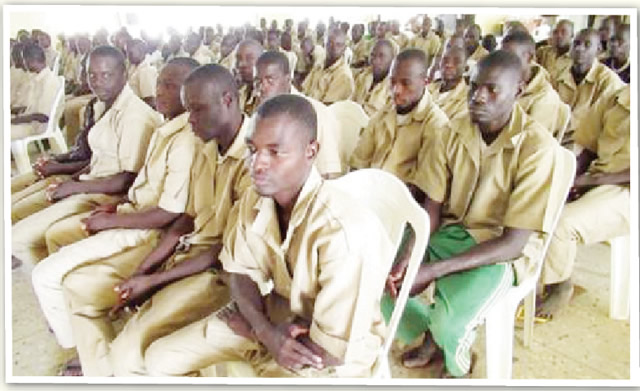THE Nigerian Military has disclosed that more than 300 repentant terrorists are currently undergoing rehabilitation, while over 2,600 ex-combatants have already completed the programme under the Federal Government’s non-kinetic counter-terrorism efforts.
News Point Nigeria reports that this revelation was made by Major-General Adamu Laka, the National Coordinator of the National Counter Terrorism Centre (NCTC), during a high-level stakeholders’ and donors’ meeting held Thursday in Abuja.
The meeting focused on expanding livelihood and agricultural opportunities for former fighters and conflict-affected communities.
Laka said the efforts fall under Operation Safe Corridor, a government initiative established to deradicalise, rehabilitate, and reintegrate low-risk Boko Haram and bandit insurgents who voluntarily surrender.
“Operation Safe Corridor, a Deradicalisation, Rehabilitation and Reintegration (DRR) programme in Mallam Sidi, Gombe State, has so far graduated over 2,600 low-risk former combatants, providing them with psychosocial support, vocational training, and reintegration assistance,” Laka stated.
He added that over 300 clients are currently undergoing the process at the Mallam Sidi facility, with a rising number of surrenders being recorded, particularly from the North-West and North-Central regions of the country.
In a move to prevent relapse into violence and ensure sustainable peace, the military also launched a new agribusiness and livelihood initiative in partnership with the International Institute of Tropical Agriculture (IITA).
The initiative, titled “Seeds for Hope,” is designed to empower former insurgents, widows, and vulnerable individuals in affected communities with access to land, agricultural inputs, training, mentorship, and market opportunities.
“Sustainable reintegration is crucial. One of the lessons we’ve learned is that many former clients face uncertainty and limited opportunities once reintegrated. This can threaten the entire rehabilitation process,” Laka warned.
So far, six states have expressed interest in hosting the agri-based reintegration projects, which aim to promote inclusive economic recovery and peacebuilding across regions still reeling from the effects of insurgency.
Dr Abdoulaye Tahirau, Deputy Director-General of the IITA, described the “Seeds for Hope” initiative as a pathway to inclusive peace, stating that the programme would improve agricultural productivity and boost resilience among its target groups.
“We’re not just supporting individuals; we’re helping communities build back from conflict through agriculture and shared prosperity,” he said.
The programme will prioritize areas heavily impacted by terrorism, providing a non-violent pathway for disengaged fighters and at-risk populations to rebuild their lives.
Major-General Laka noted that a growing number of insurgents and bandits are now voluntarily surrendering in the North-West and North-Central, and plans are already underway to establish regional variants of the deradicalisation programme in these zones.
The military believes that a holistic approach balancing security operations with reintegration and socio-economic support is key to ending insurgency sustainably.
“Strategies that empower individuals and restore livelihoods are essential to building lasting peace and preventing the resurgence of extremist ideologies,” Laka added.







